Robert Frost State of Mind
Here we are again, in the middle of October, a time of year that always seems like a kind of precipice between the living and the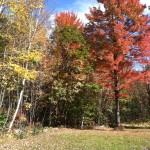 dying, when we are at once basking in the sun-filled richness that Nature is offering us everywhere and at the same time wondering how we will cope with the inevitable darkness and sense of loss that await us right around the corner. Not to be too dramatic or anything.
dying, when we are at once basking in the sun-filled richness that Nature is offering us everywhere and at the same time wondering how we will cope with the inevitable darkness and sense of loss that await us right around the corner. Not to be too dramatic or anything.
We got a newsletter from our daughter’s college the other day that proclaimed, “This time of year is so busy you’re breathless, so beautiful you gasp.”
I don’t know if I’d say that my oxygen intake has been affected, but here in these parts we would all certainly agree that the beauty of this autumn has been spectacular. Indeed, I’ve been spending so much time out in fields and on trails that I’ve gotten in a kind of Robert Frost State of Mind (in October, anyway, Billy Joel can keep New York City). If I pay close attention, I can almost hear the lines of poetry emanating from the trees and the stone walls, rising from the mist on the grass.
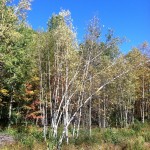 Down by the pond, the boy is still swinging on the birches; the farmer is alone in the pasture, using his whispering scythe. For a few precious moments, at least, the demands of modern technology seem completely irrelevant as well as ridiculous.
Down by the pond, the boy is still swinging on the birches; the farmer is alone in the pasture, using his whispering scythe. For a few precious moments, at least, the demands of modern technology seem completely irrelevant as well as ridiculous.
And yet, as anyone who has studied Frost’s life at all knows, he was much more complex—full of contradictions, even– than the soothing pastoral scenes he chose to depict.
On the days when I drive on the highway down to my teaching job, there is Mr. Frost again— or at least his name is on a sign indicating which exit to take to see the Derry farm, where he and his family lived from 1900-1911. All the scholars agree that these were probably his most formative years as a poet, providing him with so many images to draw upon for the rest of his life. He was raising chickens, tending fruit trees, spending a lot of time ambling around with his children outdoors, writing, and sometimes teaching too. That sounds like a lot, and it was. But as Jay Parini points out in his engaging 1998 biography called Robert Frost: A Life, Frost also had periods of depression that sometimes prevented him from being a good steward of his property and even of his family. Farming for him was definitely a mixed bag; as a husband and father, he was mostly attentive, but he also had a temper and could isolate himself.
When it comes to painting Frost’s darker side, however, Parini stops way short of where Laurance Thompson—author of a famous three volume biography on the poet—went. I was given the second volume, called Robert Frost; The Years of Triumph (1915-1938), back in high school. It looked nice and hefty on my shelf, but I can’t say that I ever actually read the thing. Recently, prompted by the splendors of fall as well as by Parini, I looked back on what I had missed.
One glance at the Index will give you some idea what kind of stance Thompson took on Frost: “Anti-Intellectual,” “Brute,” “ Charlatan”— and that’s only the beginning. When you get to “M” you find—I’m not kidding—“Murderer.” Go to page 439, and you can find Thompson’s claim that Frost actually wanted to kill four different people. It was apparently only his desire to keep up a good public face that held him back:
Now he was forced to consider strategies complicated by his literary reputation as a successful poet, and even though he still permitted his killer instincts to find expressions in only slightly veiled poems, the immediate problem was how to justify his new departure, in the eyes of those who liked to think of him as the personification of old-fashioned New England virtues. (p. 440)
Wow. This makes the passages depicting “Rage” seem almost superfluous. A poem like “Stopping By Woods on a Snowy Evening” could feel a whole lot chillier if we think of Frost as so menacing. Good thing that no one else was around when that horse stopped…
Thompson may have gone off the deep end a bit with his pessimism, but other scholars—including Parini– still have enormous respect for his highly detailed and thorough research. He got plenty right, too.
So, perhaps with biographies as with many other things, you don’t exactly choose just one of the roads diverging in a yellow wood.
And sometimes, in what would be a feat, you might be able to go through two doors at once, since each is “just as fair” as the other.
By all means, though, read the poetry itself, and let it stand alone, as dignified and beautiful as ever.
Here is one for the season, written during the Derry years, published later in Frost’s first collection, A Boy’s Will. It reminds some of Yeats, others of Keats. Take your pick; this is a master at work, both reverential and playful. All’s I can say, before going back outside with my dog, is “Amen.”
October
O hushed October mild,
Thy leaves have ripened to the fall;
Tomorrow’s wind, if it be wild,
Should waste them all.
The crows above the forest call;
Tomorrow they may form and go.
O hushed October morning mild,
Begin the hours of this day slow.
Make the day seem to us less brief
Hearts not averse to being beguiled,
Beguile us in the way you know.
Release one leaf at break of day;
At noon release another leaf;
One from our trees, one far away.
Retard the sun with gentle mist;
Enchant the land with amethyst.
Slow, slow!
For the grapes’ sake, if they were all,
Whose leaves already are burnt with frost,
Whose clustered fruit must else be lost —
For the grapes’ sake along the wall.
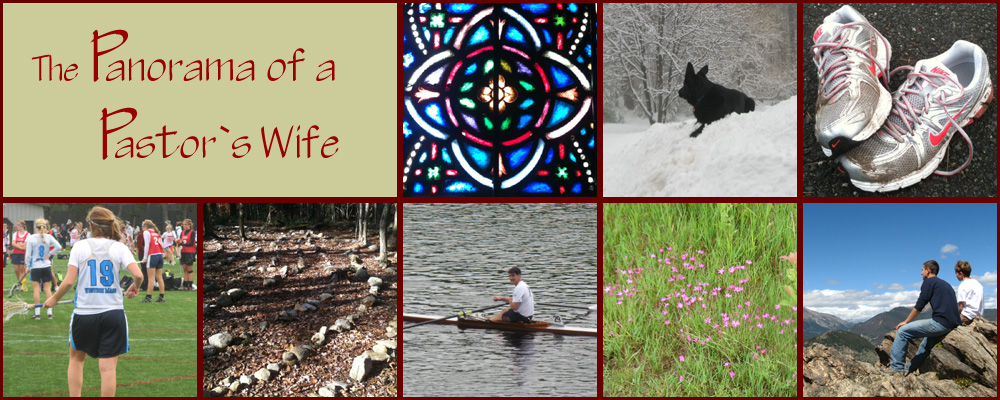

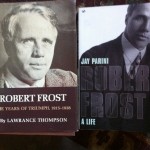
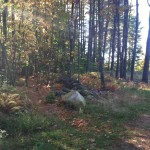

Touched my heart.